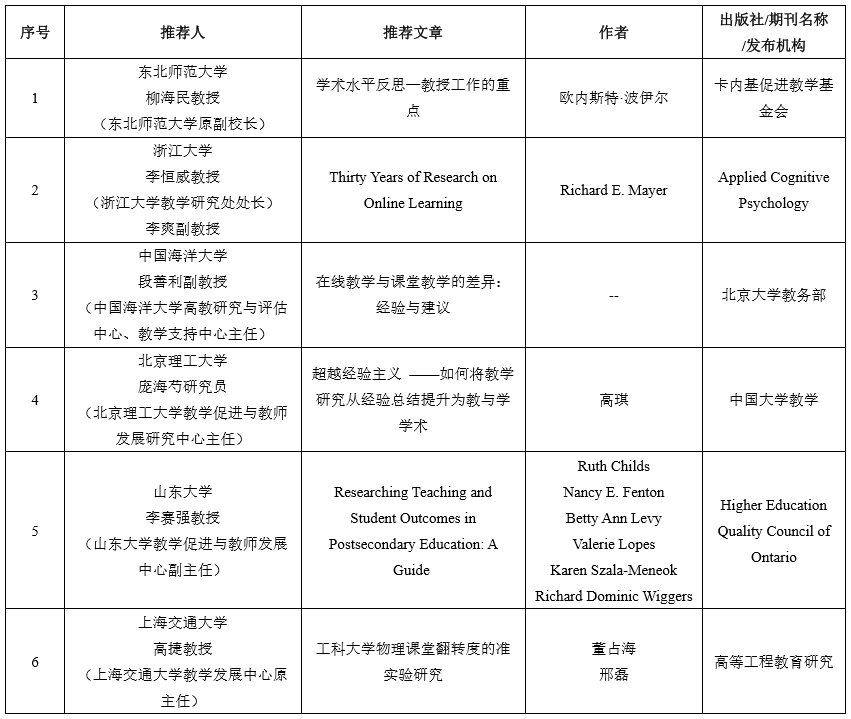尊重教师·服务教学·促进发展·提高质量
前 言
为更好地服务教师教学、促进教师专业发展,教师教学发展中心响应国家号召积极推进“停课不停学”,充分依托网络平台,建设《东师战“疫”:教学学术发展动态》专栏,该专栏将邀请国内外知名大学的教师教学发展中心负责人及教学学术研究领域专家学者,推荐相关学术论文及教学资源,内容包括教学研究、教学评价、教学方法与技能等,通过整合优质教学资源,建立数字化共享平台,向广大教师提供更便捷、更优质、更专业的服务。
本期概要

【一】
推荐人:
柳海民,东北师范大学教授,博士生导师,东北师范大学原副校长。
推荐语:
“教学学术”一词最早由美国卡内基教学促进基金会前主席厄内斯特·博耶(E.L.Boyer)提出。他针对20世纪80年代美国大学本科教学质量下滑、学校工作偏离教学中心、教师轻视教学、教学投入不足等弊端,于1990年发表了专项报告———《学术反思:教授的工作重点》。该报告围绕“作为一个学者究竟意味着什么”的问题,对学术进行了重新界定和扩充。他明确指出,“我们相信古老的对‘教学与研究关系’的讨论已经过时,给予我们所熟悉的和崇高的术语‘学术’一个更加广泛、更有内涵的解释的时候已经到来,它将能够给大学教师的全部工作以合理性。博耶认为,“学术”的内涵、教授的工作“应该包括四个不同却又相互重叠的功能,即发现的学术(scholarship of discovery)、综合的学术(scholarship of integration)、应用的学术(scholarship of application)和教学的学术(scholarship of teaching)”。教学承载着前三者(发现、综合、应用)的重托,它是知识生产与再生产后传播给下一代的唯一渠道,因此是整个教师学术系统中最重要的部分。自博耶提出教学学术概念之后,有关教学学术方面的研究引起了学术界的极大关注。教学学术被认为是高等教育的“范式转变”,它体现了一种更加平等和公正的知识理想。博耶的“教学学术”概念,很好地阐释了高校教师区别于中小学教师的职业特质,更由于“教学学术”的理论从知识流动和智慧转换的层面赋予了教学无穷的魅力,提升了高校教学的专业化地位。教学学术不仅是传授知识的过程,更是知识交流提炼、升华与抽象的过程,教学是知识生产的“一线”。基于这一认识,大学教学不仅需要丰富的知识,还需要对知识进行独创性的传播与再造。
此文值得细细品读。
推荐文章:
学术水平反思——教授工作的重点领域
欧内斯特·波伊尔
卡内基促进教学基金会
前言:
在过去的几年里,我访问了全国的一些大学和学院,人们重新注意大学本科生的教育给我留下了深刻的印象。争论集中在核心课程和校园生活的质量上。尤其有意义的是,学生自己愈来愈关心学校把重点放到教学上。这些生气勃勃的讨论使我相信,美国高等教育的90年代将成为本科教育的年代而被人们怀念。
目前争论的核心是教师的时间问题,其他所有问题都围绕这一问题展开。实际上引起争论的是奖励制度,关键性的问题是:教授们进行什么活动最受到褒奖?总之,如果教师用在学生身上的时间得不到最终的承认,谈论提高教学质量就是一句空话。
我们是从学术人员的工作方式如何逐步演变来开始这份报告的。这一方式从教学发展到服务,再发展到研究,反映了学术界内部和外部重心的转移。然后我们注意到,教师奖励制度随着第二次世界大战的结束,是如何在美国高等教育的使命越来越扩大的时候变得越来越窄;我们思考了许多大学和学院又是如何陷入各种相互竞争的目标的交叉矛盾之中。
在当前的气氛下,学生常常是受害的一方。一些冠冕堂皇的小册子向学生保证,教学将得到重视,社区精神会充满校园,博雅教育是本科学习经历的核心。但是现实状况是,在相当多的学校,教学得不到鼓励,花了很多时间对学生进行指导和咨询的教师,面临着愈来愈暗淡的提级和取得终身教授职位的前景。
教师也是受损的一方。研究和出版物成为大多数教授取得学术地位的主要手段,然而不少学术人员之所以加入教师行列,恰恰是因为他们热爱教学和服务,甚至就是为了使世界变得更好。但是,他们的专业性的义务并未得到应有的承认,我们面临的是很多学校存在着一种限制而不是保持这样一种创造性的气氛。
学院和大学还因目标上的混乱受到削弱。卡内基基金会最近对学生生活的研究还表明,校园里社会分离和分裂现象增长,不文明的行为增加,人们关注社区精神的减弱。调查反映从东海岸到西海岸,大学都在加强对本校忠诚的同时,寻求坚持多样性的方式。现在是提出教师奖励制度如何在这一方面起促进作用的时候了。
根据目前的形势,最终受损的还是国家。当前比历史上任何时期都更需要把学术人员的工作和校园以外的社会和环境的挑战结合起来。然而,如果把学校的使命规定得特别狭窄,或者如果对教师的奖励制度不适当地受到了限制,美国高等教育丰富的多样性和潜力就不可能完全实现。很清楚,研究是至关重要的,我们同时需要对服务有一个奖励性的承诺。
因此,我国的大学和学院当前面临的最重要的任务就是打破多少年来人们已谈腻了的所谓教学与研究关系的辩论模式,以更富创造性的方式确定何为一个学者。现在是全面认识教师的智力和高等教育应当表现出的巨大的多样性的时候了。
要使美国高等教育保持活力,我们就要对教授的工作有一个更富创造性的看法。为迎接这一挑战,我们在本报告中提出了关于学术水平的4个观点一发现、综合、应用和教学。我们在建议这些活动时强调一点,我们的意图是引起讨论,而不是对其加以限制。
最后,我们需要各学校之间少一些相互模仿,多一点以各自特点为自豪的气氛。是结束那种阻碍发展的做法的时候了。学校不应常常只根据其在外面的地位,而应根据由自己特殊的使命决定的价值观来衡量自己。让我们一致同意,90年代将成为大学本科教育的10年。但是,我们也应坦率地承认,我们为促进教育,作出的努力能实现到何种程度,很大程度上取决于确定学术水平内涵的方式,取决于学术水平受到奖励的方式。
文章来源:
欧内斯特·波伊尔.学术水平反思—教授工作的重点领域[R].卡内基促进教学基金会,1990.
【二】
推荐人:
李恒威,浙江大学教授,博士生导师,教学研究处处长。
李爽,浙江大学副教授,博士生导师。
推荐语:
今年这个特殊的寒假,在教育部“停课不停学”通知下达后,线上学习第一次在我国全面大力普及。作者文中介绍了其有关在线学习研究30年的进展。文中反复提到的观点是:学习有赖于运用教学方法,而不是单凭教学媒体能够奏效。
推荐文章:
Thirty Years of Research on Online Learning
Richard E. Mayer
University of California, Santa Barbara
ABSTRACT: This paper presents a personal account of developments in research on online learning over the past 30 years. Research on how to design online instruction represents an example of applying the science of learning to education. It contributes to the science of learning(as exemplified by developments in cognitive load theory, the cognitive theory of multimedia learning, and incorporating metacognitive, motivational, and affective aspects of learning), the science of instruction (as exemplified by the continuing development of research-based principles of instructional design), and the science of assessment (as exemplified by supplementing self-report surveys and retention tests with multilevel transfer tests, log file data during learning, and cognitive neuroscience measures of cognitive processing during learning). Some recurring themes are that learning is caused by instructional methods rather than instructional media, so research should focus on features that are uniquely afforded by digital learning environments; instructional practice should be grounded in rigorous and systematic research, including value-added experiments aimed at pinpointing the active ingredients in online instruction; research in online learning should identify boundary conditions under which instructional techniques are most effective; and research in online learning should test and contribute to learning theory.
文章来源
Richard E. Mayer. Thirty Years of Research on Online Learning[J]. Applied Cognitive Psychology, 2019,33:152-159.
【三】
推荐人:
段善利,中国海洋大学副教授,高教研究与评估中心、教学支持中心主任。
推荐语:
此文对于当前如何组织教学,应秉持怎样的认识和态度有很好的启示,能够帮助大家纠正一些错误的做法,减少不必要的投入,切实提高线上教学的实效性,提升教与学双方的效率和效果。
推荐文章:
在线教学与课堂教学的差异:经验与建议
概要:在当前特殊时期,有不少原本不熟悉在线教学的教师要迅速开展在线教学工作。那应该如何认识线上课堂和以往线下课堂的区别,如何利用现有的手段保障在线学习质量,如何从种类繁多的新技术挑选适应自己的技术?我校几位老师贡献出多年成功实施在线教学的经验,整理如下,供新开展在线教学的教师参考。
文章来源:
转载自北京大学教务部
https://mp.weixin.qq.com/s/rkfxCEMs_LbVLLFEzfTyTQ
【四】
推荐人:
庞海芍,北京理工大学研究员,教学促进与教师发展研究中心主任。
推荐语:
目前在许多高校中,教师的教学与研究工作出现失衡,其根本原因在于传统上将教学工作看作是个体化的经验性活动。现代学习理论的发展已经证明教与学的过程中存在普遍的客观规律。教与学学术(SoTL)将这些客观规律在学术的意义上来加以研究,并符合公开性、同行评议和共同体知识建构三项基本的学术标准。教与学学术研究可以将教学研究从经验总结的层次提升到学术研究的层次,在教育教学普遍规律的支撑下服务于各学科的专业教学,提升教学实践的质量和水平。同时,教与学学术研究也将促进学科教师的教学交流和公共知识财富的生产,构建出富有活力的教与学学术共同体,为高等学校的教学质量提升提供新的思路。
推荐文章:
超越经验主义 ——如何将教学研究从经验总结提升为教与学学术
高琪
北京理工大学自动化学院
摘要:目前在许多高校中,教师的教学与研究工作出现失衡,其根本原因在于传统上 将教学工作看作是个体化的经验性活动。现代学习理论的发展已经证明教与学的过程中存在 普遍的客观规律。教与学学术(SoTL)将这些客观规律在学术的意义上来加以研究,并符合 公开性、同行评议和共同体知识建构三项基本的学术标准。教与学学术研究可以将教学研究 从经验总结的层次提升到学术研究的层次,在教育教学普遍规律的支撑下服务于各学科的专 业教学,提升教学实践的质量和水平。同时,教与学学术研究也将促进学科教师的教学交流 和公共知识财富的生产,构建出富有活力的教与学学术共同体,为高等学校的教学质量提升 提供新的思路。
文章来源:
高琪.超越经验主义——如何将教学研究从经验总结提升为教与学学术[J].中国大学教学,2017(08):45-49.
【五】
推荐人:
李赛强,山东大学教授,教学促进与教师发展中心副主任。
推荐语:
这篇文章是加拿大女王大学教学发展中心推荐的教学学术方面的参考资料。教学学术并不神秘!本篇文章简单明了,指导性强,明确阐释了教学学术思考的全过程。从开始的实践问题的思考,到聚焦研究问题,进而进行研究设计和发表,其中还有对研究中伦理问题的考量。
推荐文章:
Researching Teaching and Student Outcomes in Postsecondary
Education: A Guide
Ruth Childs Nancy E. Fenton Betty Ann Levy Valerie Lopes Karen Szala-Meneok
Richard Dominic Wiggers
INTRODUCTION: Over the past decade there has been an upsurge of interest in the quality of postsecondary education, with a particular focus on learning, engagement, and other student outcomes. Instructors, administrators, and other staff across the postsecondary sector have been investigating innovative approaches and services, while many institutions, faculties, departments, and professional associations have established teaching and learning centres or offices to help enhance student success. Governments and governmental organizations have provided support for new approaches and for research projects evaluating them.
This guide, co-sponsored by the McMaster Centre for Leadership in Learning (CLL) and the Higher Education Quality Council of Ontario (HEQCO), and endorsed by the Society for Teaching and Learning in Higher Education (STLHE) and the Canadian Association of College and University Student Services (CACUSS), is intended to assist researchers and evaluators of postsecondary educational outcomes. The intended audiences for this document include, but are by no means restricted to, the following:
• faculty members and educational developers investigating innovative approaches or technologies designed to enhance learning in postsecondary contexts;
• faculty members and administrators leading initiatives for students enrolled in programs or courses that are considered particularly challenging;
• anyone involved in professional development initiatives for faculty, graduate students, and others intended to enhance teaching and learning effectiveness;
• student service providers at postsecondary institutions; and
• students and student associations focusing on effective teaching, learning and student success.
The origin of this publication was a guidebook published in 2010 by CLL at McMaster University in Hamilton.1 The Centre for Leadership in Learning has actively supported the Scholarship of Teaching and Learning (SoTL) and the purpose of its guide was to support faculty, staff, and graduate students who wanted to engage in this work.
The Scholarship of Teaching and Learning, described in more detail in Appendix A, has developed to explore specific questions about teaching and learning by engaging with the literature, conducting research, and making public the research results. Support of SoTL by teaching and learning centres may take place in several ways:
• offering modest grants for SoTL research;
• providing faculty fellowships to engage in SoTL work;
• hosting symposia and conferences for sharing SoTL research; and
• employing educational consultants to support work in SoTL.
The Higher Education Quality Council of Ontario (HEQCO) was founded in 2005. It is an arm’slength agency of the Government of Ontario that funds and undertakes research to provide recommendations for evidence-based improvements to the postsecondary education system in Ontario. Over the past three years, HEQCO has funded evaluations of a wide range of interventions and initiatives designed to promote student success, and has disseminated those findings to as broad an audience as possible.
The pages that follow are informed by the original McMaster guidebook, and the recent experiences of researchers at Ontario colleges and universities. The objective of this guide is to encourage all those involved in postsecondary education to continue to be innovative in their practices to improve student success, and to engage in research on and evaluation of those practices.
The authors are grateful for the suggestions and support of the many scholars who have been consulted during our review process and elsewhere, and who have made suggestions about this publication—we could not have done it without you! In addition, we would like to acknowledge the support and input of HEQCO and of CLL.
文章来源:
Elgie S , Childs R , Levy B A , et al. Researching Teaching and Student Outcomes in Postsecondary Education A Guide[J]. Higher Education Quality Council of Ontario, 2012.
【六】
推荐人:
高捷,上海交通大学教授,教学发展中心原主任。
推荐语:
作者董占海是上海交通大学物理与天文学院的教授,曾获得校“最受学生欢迎的教师”奖、“卓越教学奖”、首届“教书育人奖”一等奖等。他取得的这些成绩,即依赖于教学经验的积累,更得益于积极主动的教学学术研究。
推荐文章:
工科大学物理课堂翻转度的准实验研究
董占海 邢磊
上海交通大学物理与天文学院 教学发展中心
摘要:课堂教学中学生的参与程度(简称课堂翻转度)的高低直接影响课堂教学质量,是不是课堂的翻转程度越高越好?本文将通过实验确定最佳的课堂翻转程度,包括翻转度的量度及其确定、不同翻转度教学实验设计和教学效果对比等方面的研究内容。
文章来源:
董占海,邢磊.工科大学物理课堂翻转度的准实验研究[J].高等工程教育研究,2018(01):136-138+145.
教师教育研究院
教师教学发展中心
2020年2月27日